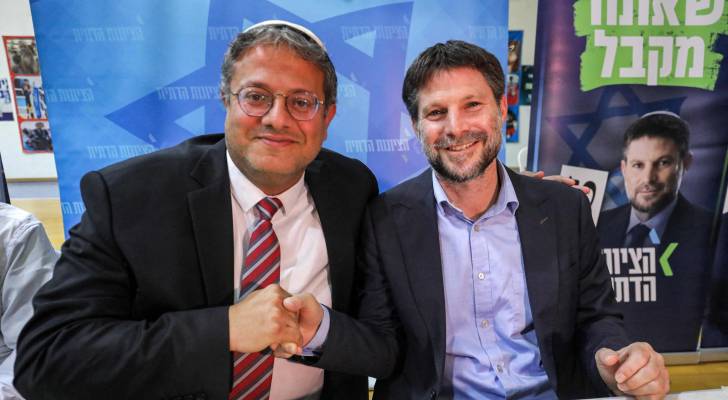Itamar Ben-Gvir (left) and Bezalel Smotrich (right) (Credit: Getty Images)
ICC Chief Prosecutor was preparing arrest warrants for Smotrich, Ben-Gvir
The International Criminal Court (ICC) had been preparing potential arrest warrants for two far-right "Israeli" ministers over their roles in the expansion of Jewish settlements in the West Bank, according to current and former court officials, before Chief Prosecutor Karim Khan went on leave amid an internal misconduct investigation.
According to a report by the Wall Street Journal (WSJ), the cases, involving "Israeli" Finance Minister Bezalel Smotrich and National Security Minister Itamar Ben-Gvir, focus on whether their policies may constitute war crimes under international law. Khan’s temporary departure, linked to a UN probe into allegations of sexual misconduct against him by a court staffer, has left decision-making in the hands of his deputies. It remains unclear how or whether they will move forward.
The ICC has a mandate to investigate alleged crimes committed in Palestinian territories since 2014, when the Palestinian Authority formally accepted the court’s jurisdiction. While the ICC has not confirmed the status of any individual cases, a court spokesperson reiterated this mandate.
Prosecutors are said to be examining whether Smotrich and Ben-Gvir’s actions — including support for settlement construction and alleged calls to reoccupy Gaza — violate the Geneva Conventions, which prohibit an occupying power from transferring its civilian population into occupied territories.
Following reports of the court’s deliberations, Ben-Gvir responded defiantly, stating, “No arrest warrant of any kind will deter me from continuing to work for the people of Israel and the land of Israel.”
Both Smotrich and Ben-Gvir are outspoken proponents of deepening "Israel’s" control over the West Bank and are key members of Prime Minister Benjamin Netanyahu’s governing coalition. They both live in settlements considered illegal under international law.
The ICC’s examination of these two officials marks a potential expansion of its inquiry beyond the Gaza war. The court issued arrest warrants last year for Netanyahu and Defense Minister Yoav Gallant, accusing them of war crimes and crimes against humanity in Gaza, including allegedly blocking humanitarian aid to the enclave following October 7.
The ICC has faced significant political pushback over its actions. Khan, who announced the Netanyahu and Gallant warrants publicly despite internal advice to the contrary, has already been sanctioned by the US. Legal experts warn that further warrants could provoke additional punitive measures, possibly targeting the court itself.
“The ICC is facing an existential threat,” said Mark Ellis, executive director of the International Bar Association (IBA). He noted that pursuing war crimes cases tied to settlement expansion, while legally sound, would place the court in even deeper political turmoil. “It’s a strong legal argument,” Ellis said, “but the political part of this, my God…”
The "Israeli" government maintains that the West Bank is not “occupied” under international law and disputes the court’s jurisdiction over its actions there. However, in 2021, the ICC ruled that Palestine qualifies as a state party under the Rome Statute, granting the court authority to investigate crimes committed in the Palestinian territories — even though "Israel" is not an ICC member.
Settlement activity in the West Bank has surged in recent years. In one notable example, Smotrich backed a controversial move to legalize 13 previously unauthorized outposts, effectively converting them into state-recognized settlements eligible for government funding.
“This is another important step on the way to de facto sovereignty in Judea and Samaria,” Smotrich said at the time, using terminology favored by "Israel’s" far right.
As scrutiny intensifies internationally, including from allies like Canada and several European governments, the ICC’s actions in the coming months could reshape the legal and diplomatic landscape for "Israel" and the broader Middle East.




